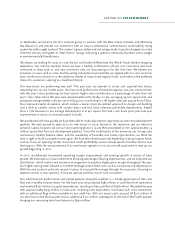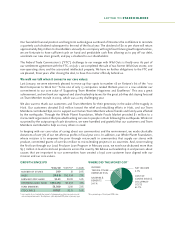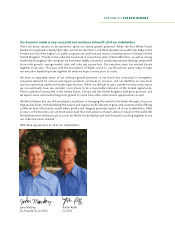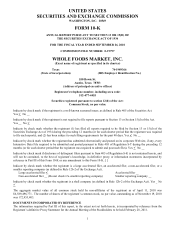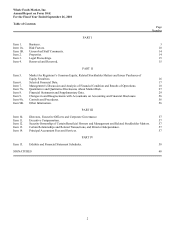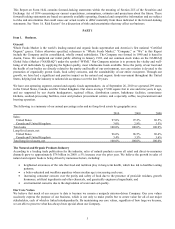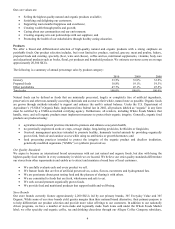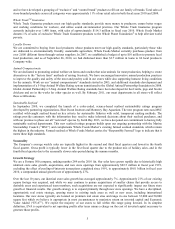Whole Foods 2010 Annual Report Download - page 14
Download and view the complete annual report
Please find page 14 of the 2010 Whole Foods annual report below. You can navigate through the pages in the report by either clicking on the pages listed below, or by using the keyword search tool below to find specific information within the annual report. 8
All of our full-time and part-time team members are eligible to receive stock options through annual leadership grants or
through service-hour grants once they have accumulated 6,000 service hours (approximately three years of employment).
Approximately 92% of the equity awards granted under the Company’s stock plan since its inception in 1992 have been
granted to team members who are not executive officers.
Team members are encouraged to take an active role in choosing the benefits made available by the Company by
participating in a Company-wide benefits vote every three years. Under the current plan voted on by team members, Whole
Foods Market provides health care at no cost to full-time team members who work 30 or more hours per week and have
worked a minimum of 10,000 service hours. In addition, the Company provides Personal Wellness Accounts (“PWA”) of up
to $1,800 per year to help cover the cost of deductibles and other allowable out-of-pocket health care expenses not covered
by insurance.
For the past 13 years, our team members have helped Whole Foods Market become one of FORTUNE magazine’s “100 Best
Companies to Work for in America.” Ranking 18th overall and sixth among large companies in 2010, we are one of only 13
companies to make the “100 Best” list every year since its inception.
Competition
Food retailing is a large, intensely competitive industry. Our competition varies across the Company and includes but is not
limited to local, regional, national and international conventional and specialty supermarkets, natural foods stores, warehouse
membership clubs, smaller specialty stores, farmers’ markets, and restaurants, each of which competes with us on the basis
of store ambiance and experience, product selection, quality, customer service, price or a combination of these factors. Our
commitment to natural and organic products, high quality standards, emphasis on perishable product sales, and empowered
team members who focus on unparalleled customer service differentiate us from the competition and have created a loyal
core customer base. We believe our passionate support of causes and leadership in areas important to our customers reinforce
our position as the authentic retailer of natural and organic foods, making us the preferred choice for customers aspiring to a
healthier lifestyle.
Marketing
We spend much less on advertising and marketing than other supermarkets – approximately 0.4% of our total sales in fiscal
year 2010. Instead, we rely on word-of-mouth recommendations and testimonials from our shoppers, and we allocate our
marketing budgets among national and regional programs and our individual stores. We also connect and engage with our
customers through social media websites, in addition to e-newsletters and our own corporate website and blog at
www.wholefoodsmarket.com. Our stores spend most of their marketing budgets on in-store marketing-related activities,
including promotional signage and events such as local farmers’ markets, taste fairs, classes, tours and product samplings.
We also dedicate resources to The Whole Deal in-store value guide. Our marketing support mirrors our business model, as
well as our commitment to the community and environment. Each store retains a separate budget for making contributions to
a variety of philanthropic and community activities, fostering goodwill and developing a high profile with the community.
Contributions (including in-kind contributions of food) to not-for-profit organizations amount to at least 5% of our after-tax
profits annually.
Social Media
Social media provides us with a powerful way to communicate and interact with our customers, giving us insight at both a
local and global level as to how we are viewed and what our customers want and expect from us. Currently, we have over
387,000 fans on Facebook and over 1.8 million followers on Twitter. In addition, many of our stores have set up their own
Facebook and Twitter accounts.
The Whole Deal
We launched our national “The Whole Deal” campaign in fiscal year 2008 to emphasize the value of our product offerings.
The program includes The Whole Deal value guide available in all of our U.S. stores, which contains coupons, budget-
conscious recipes, money-saving tips and more; in-store Value Tours led by our “Value Gurus” to help shoppers find the best
deals in every department; and Sure Deal specials, which highlight everyday pricing on high-quality products our customers
want, not discounts on overstocked or discontinued items. In fiscal year 2010, the average basket containing a coupon from
The Whole Deal value guide was $66 and contained 20 items compared to our overall average basket in identical stores
which was $34 and contained eight items.
Corporate Responsibility
We seek to be a deeply responsible company in the communities where we do business around the world, providing ethically
sourced, high-quality products and transparent information to our customers, reducing our impact on the environment, and
actively participating in our local communities. We believe that many customers are concerned about health and nutrition,
food safety, fair trade and the environment and choose to shop our stores for these reasons. “Farm-to-fork” traceability
allows them to make more informed purchasing decisions and “vote” with their dollars.


